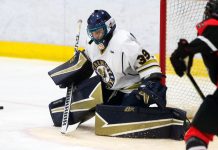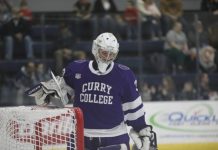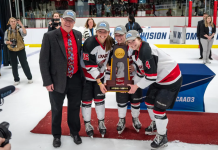CBS Sports Network is celebrating its 10th anniversary of broadcasting a national package of college hockey games. It started with a test game, Michigan at Ohio State in the months before the official launch of the network, and has never looked back.
Well, actually, it is looking back. The network that was started as College Sports Television (CSTV) and became the CBS College Sports Network before settling into its current identity is looking back at the decade on air in college hockey. The challenge is to name the top 10 players of the past 10 years in college hockey. The fan voting just closed and your results will be shown on the network starting soon. My list will also air in the upcoming weeks during our broadcasts.
This idea started as a random thought in my head last spring, and when testing the waters on Twitter it gained some traction. People love lists, people love arguing over who was best, and college hockey fans are passionate about the sport and their teams (if they weren’t we would have never made it out of year two at the network).
The question I get asked about this is what are the criteria? In tossing this out to NHL scouts, player development people, NCAA coaches (a group from which I wish more had participated) and trusted hockey minds I explained the basis for evaluating candidates for the top 10.
Here they are in no particular order of importance. The biggest thing to remember is that where the student-athlete played has no bearing on candidacy. Whether he played at West Point or Western Michigan, what we are looking at is the player’s career.
That being said, accomplishments are criteria. That includes individual or team. For example, if a kid played in three Frozen Fours, was in the top three in scoring on his team a couple of those seasons, was an All-American, made a Hobey Baker Award top 10 a time or two, well, that is a tremendous career. Look at the body of work.
Another is that whether the player went on to stardom at the NHL level has NO bearing on his candidacy. There are several really good NHLers who had above-average NCAA careers but there are also some players who had great college careers that either flamed out as NHL players or just became good AHL guys. The post-college-hockey career does not factor in.
The third is draft status. It means little to us if the kid was a first-round pick or played his NCAA career as a free agent.
Skill level matters, but this is one you can debate to the end of time and get no answer. Who was better: Gretzky or Lemieux? I have no answer for that. Who had the better career? Well, that is another issue and taking the pure skill out of it opens a different avenue for debate. Skill might be a deciding factor when numbers are similar and accomplishments are similar. Something has to break a tie. Skill level counts but is a sub-category to career accomplishments.
Career numbers also matter, but remember that numbers can be inflated depending on which opponents the player faced. What counts is how good a career the player had. If the player played on a powerhouse for his time in the NCAA his numbers should be pretty good. This is where some unique chatter happened.
Two names came up in the great-career category. One was Eric Ehn of Air Force, the other was Cory Conacher of Canisius. Fans of the big four conferences always go nuts when Atlantic Hockey guys get too much publicity because they feel the competition is not the same there as it is in, say, the WCHA. I’m not getting into that debate.
What was said about Ehn was that despite not being surrounded by high-end kids like T.J. Oshie was at North Dakota, Ehn had a better career. He had to do more by himself than Oshie, whose linemates were Jonathan Toews and Hobey winner Ryan Duncan. Conacher’s name came up in a similar fashion when compared to dynamic, smaller players like Carter Camper, Marty Sertich, Brett Sterling, James Marcou and Duncan who were better known.
You could argue some goalies were left off the list of the top 30 that we have identified after putting my list of 150 players in front of scouts. Two goalies have been brought up by fans as not being in that group of 30: Michigan’s Shawn Hunwick and Wisconsin’s Brian Elliott. The outrage seems sparked by the inclusion of Denver’s Peter Mannino over both.
Mannino and Elliott both won national titles. Both were important parts of those teams that won. Both have very good career numbers. Hunwick also had a great career and played in a Frozen Four. He was an overtime goal away from being a national champion. Trying to identify the best of those three is nearly impossible. All were big-game goalies and all have accomplishments that are somewhat equal.
One is in the ECHL (Hunwick), one is in the AHL (Mannino) and one is in the NHL (Elliott). That does not factor in. Mannino had three seasons of double-digit wins; that is a factor. Hunwick had two but unlike Mannino he was not a big factor for all four years of his collegiate career. Hunwick was a rock for two-and-a-half seasons. Mannino saw a lot of action for all four, only once playing fewer than 20 games. He played more games as a freshman then Elliott had played entering his junior year. These are some of the numbers criteria we used to make selections.
Somehow, Mannino passed the eyeball test better than the other two when it came to his NCAA career. Some scouts just felt, with everything else being equal, Mannino was the best of that trio skill-wise at the NCAA level.
Now, how good the player was is a factor. Mike Brennan of Boston College had a great career but his great career is different than Nathan Gerbe’s great career based solely on numbers and accomplishments. Jack Johnson had a nice career at Michigan but was his time there comparable to Matt Carle’s at Denver or even that of Brett Skinner?
Is our top 30 list flawed? You bet it is. (See the list at the end of this story.) Why? Because everyone sees things differently. We needed to get it narrowed down so we could get input from you. People who read USCHO are passionate college hockey fans.
Here is your challenge: Be objective! Look at that list and don’t make an argument for your favorite player. That doesn’t help unless your favorite player is a legit candidate that you feel was overlooked. I got a lot of that from the Matt Gilroy backers, and to me that is legit. I loved Gilroy’s career at Boston University and when I fought for Gilroy I got a lot of “real good player, good career, his age was a factor in some of his later dominance.” That hurt Maine’s Michel Leveille, who I loved as a player.
Older guys who dominated as juniors and seniors got a little less love by the expanded committee. Should that count? That’s up to you. You want Gilroy, fight for him. The list is not mine but one to gauge opinion from the fan base. Write-ins are allowed. You matter.
When all is said and done and it is time to pick the top 10, my notes from those we polled, fan voting and some hard looks at the minute details that define a great career will determine my list.
Like our list or not, the chatter generated about some of the players that played in the last 10 years is terrific for our game and our industry. When was the last time you had an excuse to debate the merits of players like Steve Saviano, Robbie Earl, Matt Rust or Lee Sweatt?
Use your brains, use your hockey sense and see who passes the eyeball test as one of the top 10 players of the last 10 years. The list will be revealed during CBS Sports Network broadcasts later this season. If you want to make a case for a player, post in the comments below or hit me on Twitter at @DaveStarmanCBS.
Here’s the list of 30 that will be whittled down to the top 10:
Spencer Abbott, Maine
David Backes, Minnesota State
JT Brown, Minnesota-Duluth
Carter Camper, Miami
Matt Carle, Denver
Cory Conacher, Canisus
Jack Connolly, Minnesota-Duluth
Ryan Duncan, North Dakota
Justin Faulk, Minnesota-Duluth
Gabe Gauthier, Denver
Nathan Gerbe, Boston College
Jack Johnson, Michigan
Ryan Jones, Miami
Jeff Lerg, Michigan State
Peter Mannino, Denver
Ryan McDonagh, Wisconsin
Andy Miele, Miami
John Muse, Boston College
Brian O’Neill, Yale
Zach Parise, North Dakota
Scott Parse, Nebraska-Omaha
Joe Pavelski, Wisconsin
Kevin Porter, Michigan
Matt Read, Bemidji State
Justin Schultz, Wisconsin
Marty Sertich, Colorado College
Brett Skinner, Denver
Brett Sterling, Colorado College
Thomas Vanek, Minnesota
Colin Wilson, Boston University


